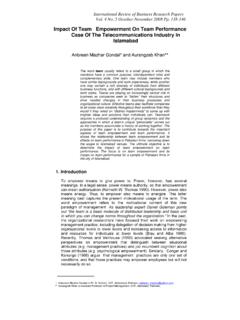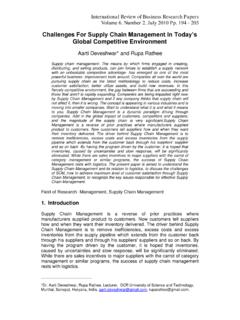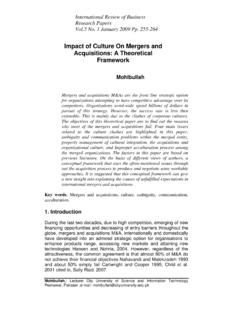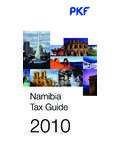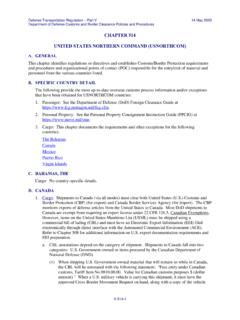Transcription of Uhomoibhi Toni Aburime Felix Alio** - bizresearchpapers.com
1 International Review of Business Research Papers No. 1 January 2009 Pp. 321-339 Islamic Banking: Theories, Practices and Insights For Nigeria Uhomoibhi Toni Aburime * and Felix Alio** The broad aim of this paper is to introduce knowledge of Islamic banking theories and practices to banking and finance scholars and practitioners in Nigeria, as well as draw some useful insights on Islamic banking in Nigeria. Prohibition of interest, low consumer lending, profit and loss sharing and high real sector investing are primary characteristics of Islamic banks.
2 Islamic banks operate the three conventional deposit accounts. They also engage in investment financing, trade financing, lending, and other financial services. Differences between Islamic and conventional banks lie in prohibition of interest, emphasis on Islamic principles of morality, emphasis on collateral, certainty of deposits and returns, liquidity risk and solvency risk; while similarities between Islamic and conventional banks lie in profit-making objective and nature of banking services. Though there is a dearth of Islamic banks in Nigeria, Islamic banking has become a fast growing concept.
3 The emergence of full-fledged Islamic banks in Nigeria should be expected in the near future. Keywords: Islamic Banking; Nigeria 1. Introduction Islamic banking refers to a system of banking or banking activity that is consistent with Islamic law Shariah principles and guided by Islamic economics. The broad aim of this paper is to introduce knowledge of Islamic banking theories and practices to banking and finance scholars and practitioners in Nigeria, as well as draw some useful insights on Islamic banking in Nigeria. In the main, there are two motivations for this paper.
4 Firstly, the Nigerian banking industry is current trend is directed toward the emergence of Islamic banks sometime in the near future to meet the needs of the devout Muslim populace. Strategic foreign investors, eyeing stakes in Nigeria's financial sector, recently requested from the Central Bank of Nigeria CBN, details of regulations governing operations of Islamic banking in Nigeria Shady, 2008. Muslim economic bigwigs in Nigeria are also attempting to promote Jaiz Bank Nigeria, a full-fledged Islamic bank Sunmonu, 2008: 64. For the first time, the Nigerian Bar Association NBA Section on Business Law had a session on Islamic Business Law at its 2008 annual conference.
5 _____ * Uhomoibhi Toni Aburime1 Lecturer, Department of Banking and Finance, University of Nigeria, Enugu Campus, Nigeria. : * Felix Alio *Lecturer, Department of Banking and Finance, University of Nigeria, Enugu Campus, Nigeria. Aburime & Alo 322 The sub-theme was Islamic Business Law An Alternative to Development in a Global Economy . Unfortunately, these recent developments are matched by a dearth of Islamic banking knowledge in Nigeria. Secondly, there is dire need for banking policy makers to be fully enlightened on what Islamic banking is all about and the plausible insights of Islamic banking in Nigeria, as this will enable them brace up for the tasks and challenges that lie ahead.
6 To achieve its broad aim, the remainder of this paper is organized in the following manner. The next section is a discourse of the evolution of Islamic banking. Section 3 outlines primary characteristics of Islamic banks. Section 4 outlines the nature of Islamic bank accounts. Section 5 outlines Islamic banks modes of financing. Section 6 is a brief discourse of differences between Islamic and conventional banks. Section 7 is a brief discourse of similarities between Islamic and conventional banks. Section 8 exposes criticisms of Islamic banking. Section 9 is a discourse of the future of Islamic banking.
7 Section 10 portrays insights on Islamic banking in Nigeria. The last section concludes the paper. 2. Evolution of Islamic Banking Commercial banks were first introduced into Muslim countries at a time when they were politically and economically at a low ebb, in the late 19th century. Main banks in the home countries of imperial powers established local branches in the capitals of subject countries. These banks catered mainly for the import export requirements of foreign businesses and were generally confined to the capital cities. As a result, the local population remained largely untouched by the evolving banking system at the time.
8 However, as time went on it became difficult to engage in trade and other activities without making use of the commercial banks. Even then many devout Muslims confined their involvement to transaction activities such as current accounts and money transfers. Borrowing from the banks and depositing their savings with them were strictly avoided in order to keep away from dealing in interest which is prohibited by Islam. As time passed by, governments, businesses and individuals began to freely transact business with the banks, with or without liking it.
9 This state of affairs drew the attention and concern of Muslim intellectuals who felt there was great need to maintain Muslim laws and principles even in the sphere of financial transacting Abdul Gafoor, 2007. T he first modern experiment with Islamic banking was undertaken in Egypt under cover, without projecting an Islamic image, for fear of being seen as a manifestation of Islamic fundamentalism which was anathema to the political regime. The pioneering effort, led by Ahmad El Najjar, took the form of a savings bank based on profit-sharing in the Egyptian town of Mit-Ghamr in 1963.
10 The bank was very popular and prospered. The experiment lasted until 1967, by which time there were nine such banks in the country. These banks, which neither charged nor paid interest, invested mostly by Aburime & Alo 323 engaging in trade and industry, directly or in partnership with others, and shared the profits with their depositors Siddiqi, 1988. During the 1970s, a number of full-fledged Islamic banks came into existence in North Africa and the Middle East. Dubai Islamic Bank was established in 1975; Faisal Islamic Bank of Sudan was established in 1977; Faisal Islamic Bank of Egypt was established in 1977; and Bahrain Islamic Bank was established in 1979.
